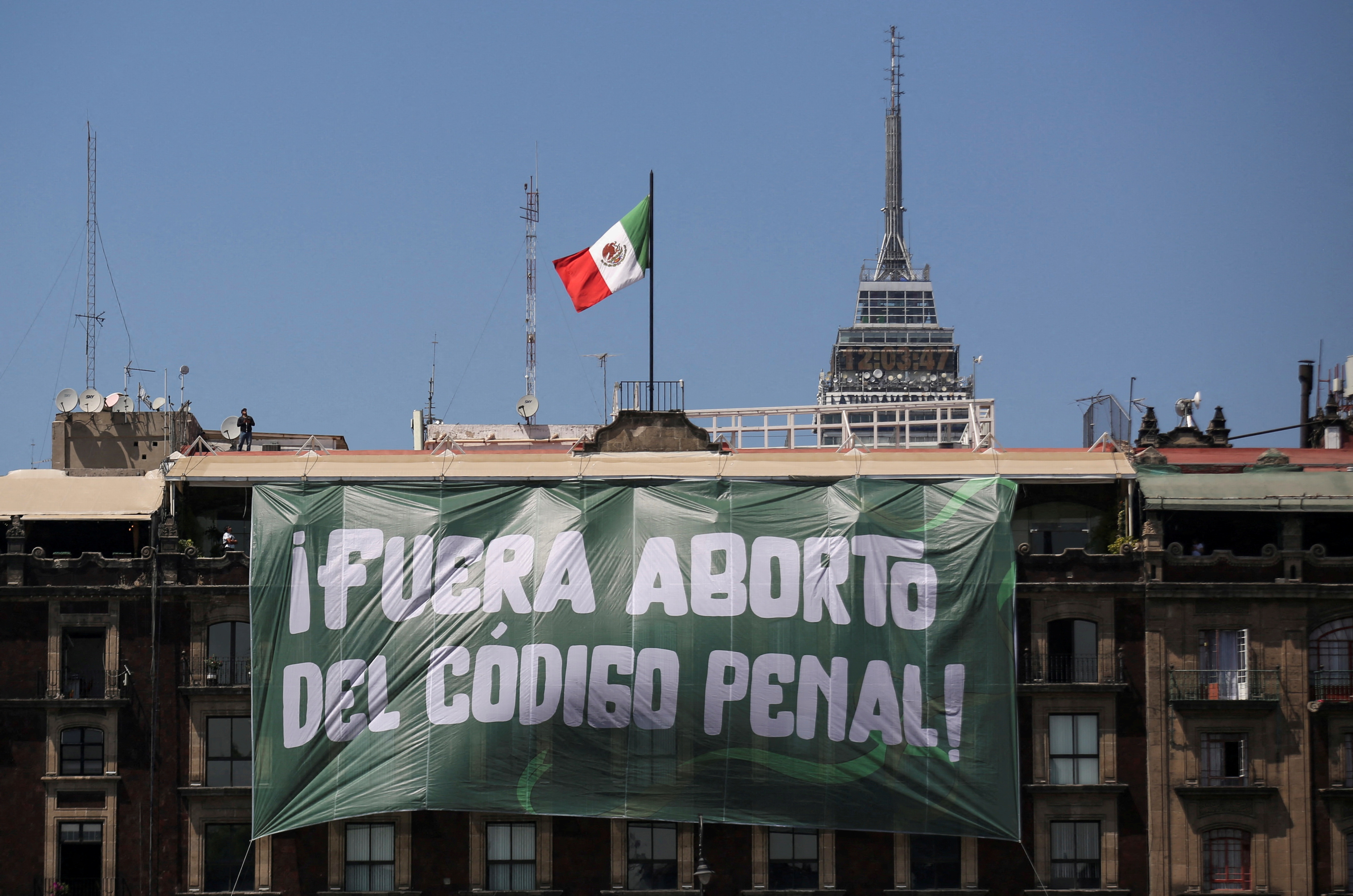Reuters
August 30, 2023

A banner reading: "Abortion Out of the Penal Code" hangs from a building during International Women's Day, at the Zocalo Square in Mexico City, Mexico March 8, 2023. REUTERS/Quetzalli Nicte-Ha/File Photo Acquire Licensing Rights
MEXICO CITY, Aug 30 (Reuters) - Mexico's Supreme Court on Wednesday decriminalized abortion in the central state of Aguascalientes, making it the twelfth Mexican state to revoke criminal penalties for the procedure, according to the women's rights groups that filed the lawsuit.
Though Mexico's Supreme Court unanimously ruled penalizing abortion unconstitutional in 2021, most of the Latin American country's 32 states have yet to amend their local legislation.
Rights group GIRE said it had filed the suit in early 2022 alongside four other rights groups as part of a nationwide strategy to eradicate the criminalization of abortion in Mexico.
"The court concluded that the crime of self-induced and consensual abortion will cease to be applicable in the entire state," GIRE said in a statement, adding that Aguascalientes now had an obligation to provide abortion services.
Religious group ConParticipacion called the ruling "unfortunate" in a post on X, formerly Twitter, saying it showed "pre-natal violence and discrimination."
"The Supreme Court voted in favor of autonomy and the right to choose for women and people with wombs," Fondo Maria, a Mexico City-based abortion rights group, said in another post.
Many women and rights groups posted green hearts on social media, representing the so-called Green Wave, the social movement for reproductive rights that has swept Latin America since the start of this century.
The movement has been fueled by landmark cases, such as that of an 11-year-old girl in Argentina who was forced to give birth in 2019 after being raped, despite begging for an abortion.
Earlier this month, an 11-year-old rape victim in Peru was initially turned away from a hospital as she approached 18 weeks pregnant, sparking furor from rights groups and causing the United Nations to call on the state to intervene.
Some Latin American and Caribbean countries permit abortion in cases of rape or when the mother's life is at risk, but lengthy legal procedures can put the option out of reach.

A banner reading: "Abortion Out of the Penal Code" hangs from a building during International Women's Day, at the Zocalo Square in Mexico City, Mexico March 8, 2023. REUTERS/Quetzalli Nicte-Ha/File Photo Acquire Licensing Rights
MEXICO CITY, Aug 30 (Reuters) - Mexico's Supreme Court on Wednesday decriminalized abortion in the central state of Aguascalientes, making it the twelfth Mexican state to revoke criminal penalties for the procedure, according to the women's rights groups that filed the lawsuit.
Though Mexico's Supreme Court unanimously ruled penalizing abortion unconstitutional in 2021, most of the Latin American country's 32 states have yet to amend their local legislation.
Rights group GIRE said it had filed the suit in early 2022 alongside four other rights groups as part of a nationwide strategy to eradicate the criminalization of abortion in Mexico.
"The court concluded that the crime of self-induced and consensual abortion will cease to be applicable in the entire state," GIRE said in a statement, adding that Aguascalientes now had an obligation to provide abortion services.
Religious group ConParticipacion called the ruling "unfortunate" in a post on X, formerly Twitter, saying it showed "pre-natal violence and discrimination."
"The Supreme Court voted in favor of autonomy and the right to choose for women and people with wombs," Fondo Maria, a Mexico City-based abortion rights group, said in another post.
Many women and rights groups posted green hearts on social media, representing the so-called Green Wave, the social movement for reproductive rights that has swept Latin America since the start of this century.
The movement has been fueled by landmark cases, such as that of an 11-year-old girl in Argentina who was forced to give birth in 2019 after being raped, despite begging for an abortion.
Earlier this month, an 11-year-old rape victim in Peru was initially turned away from a hospital as she approached 18 weeks pregnant, sparking furor from rights groups and causing the United Nations to call on the state to intervene.
Some Latin American and Caribbean countries permit abortion in cases of rape or when the mother's life is at risk, but lengthy legal procedures can put the option out of reach.
No comments:
Post a Comment